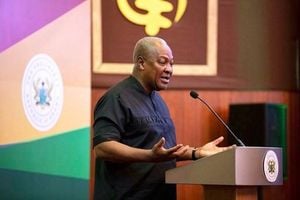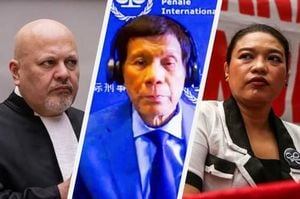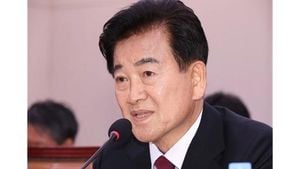The Trump administration’s recent shakeup of the U.S. intelligence community has sent ripples through Washington and beyond, raising questions about the fate of independent analysis in an era of mounting political pressure. On August 22, 2025, Lieutenant General Jeffrey Kruse was fired as head of the Defense Intelligence Agency (DIA), a move confirmed by both USA Today and Reuters. The abrupt dismissal marks the latest in a string of high-profile departures from America’s top national security posts, and lawmakers on both sides of the aisle are demanding answers.
Kruse’s exit comes at a moment of heightened tension between the White House and the intelligence agencies. According to The Washington Post, the official explanation for his removal was a “loss of confidence,” though no further details were provided by administration sources. The Pentagon and the DIA have not publicly commented, leaving a cloud of speculation hanging over the decision. The lack of transparency has only fueled concerns that the Trump administration is prioritizing loyalty over expertise—a charge that has become a familiar refrain in recent years.
At the heart of the controversy is a preliminary assessment from the DIA, leaked to several media outlets in June 2025, regarding the aftermath of U.S. air strikes on June 22 against three of Iran’s main nuclear facilities. The assessment, as reported by Reuters and The Washington Post, concluded that the strikes delayed Tehran’s nuclear program by only a few months, contradicting President Trump’s public assertion that the sites had been “destroyed.” The White House responded forcefully, condemning the assessment as “totally wrong,” and President Trump himself lashed out at outlets like CNN and The New York Times, calling them “junkies” and “fake news writers.”
Defense Secretary Pete Hegseth, siding with the president, insisted that the military campaign had been a decisive success. “Based on everything we have seen – and I’ve seen it all – our bombing campaign obliterated Iran’s ability to create nuclear weapons,” Hegseth stated, according to USA Today. This sharp divide between the administration’s narrative and the intelligence community’s findings has only intensified scrutiny of Kruse’s removal.
The fallout did not stop with Kruse. The Washington Post later reported that two more senior military leaders—Vice Adm. Nancy Lacore, chief of the Navy Reserve, and Rear Adm. Milton Sands, who oversaw Naval Special Warfare Command—were also pushed out in the days following the DIA chief’s dismissal. These moves have been interpreted by many in Washington as part of a broader effort to purge the intelligence and defense apparatus of officials perceived as insufficiently loyal to President Trump’s agenda.
Senator Mark Warner, vice chairman of the Senate Intelligence Committee, was quick to criticize the administration’s actions. “It is perhaps unsurprising that General Kruse’s removal as head of the Defense Intelligence Agency comes on the heels of a DIA assessment that directly contradicted the president’s claim to have ‘obliterated’ Iran’s nuclear program,” Warner said, according to USA Today. “That kind of honest, fact-based analysis is exactly what we should want from our intelligence agencies, regardless of whether it flatters the White House narrative. When expertise is cast aside and intelligence is distorted or silenced, our adversaries gain the upper hand and America is left less safe.”
Representative Jim Himes, the ranking Democrat on the House Intelligence Committee, echoed Warner’s concerns while expressing gratitude for Kruse’s decades of service. “If the Administration has cause to fire Director Kruse, they must provide that information to Congress immediately,” Himes stated. “Otherwise, we can only assume that this is another politically motivated decision intended to create an atmosphere of fear, something that chills the ability of the Intelligence Community to do its job and protect national security.”
But the administration has framed the recent wave of firings and staff cuts as necessary reforms. According to Reuters, President Trump and his allies have argued that the sweeping changes are part of a broader effort to reduce government staffing, cut the federal budget, and crack down on what they describe as the “politicization” or “weaponization of intelligence.” In April 2025, General Timothy Howe was removed as director of the National Security Agency (NSA), a move that affected more than 10 staff members on the White House National Security Council. The administration has maintained that these measures are designed to streamline operations and rein in what it sees as an unruly bureaucracy.
The shakeup has not been limited to the Defense Intelligence Agency. Just days before Kruse’s firing, U.S. Director of National Intelligence Tulsi Gabbard announced that she was revoking classified information from 37 current and former intelligence officials. Earlier in the week, Gabbard revealed plans to cut more than 40% of her office staff starting October 1, a move she said would save over $700 million annually. These deep cuts have raised alarms among intelligence professionals and lawmakers, who worry that the loss of experienced personnel could undermine national security at a critical juncture.
Meanwhile, the Trump administration continues to fill key diplomatic posts with trusted allies. On August 23, President Trump announced the nomination of Sergio Gore, currently head of the White House Office of Presidential Staff, as the new U.S. ambassador to India and special envoy for South and Central Asia. Gore will remain in his current role until his nomination is approved by the Senate, according to Reuters. The appointment is seen by some as an effort to strengthen the administration’s influence in a strategically vital region, while others view it as yet another example of the president rewarding loyalty over experience.
For many observers, the series of firings and appointments underscores a deeper struggle within the U.S. government over the role of independent analysis and the boundaries of executive power. While the Trump administration insists that its actions are justified by the need for efficiency and loyalty, critics argue that the moves risk politicizing intelligence and sidelining dissenting voices at a time when objective analysis is more important than ever.
As the debate rages on, one thing remains clear: the fate of America’s intelligence community hangs in the balance, with implications that extend far beyond the Beltway. Whether these changes will ultimately strengthen or weaken the nation’s security remains to be seen, but the stakes could hardly be higher.



